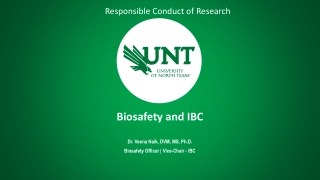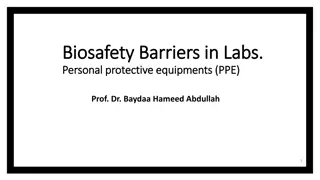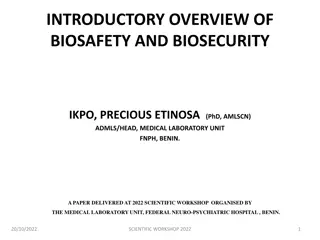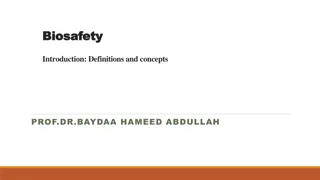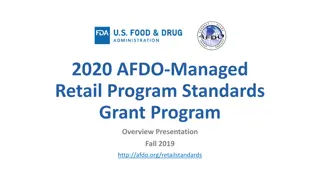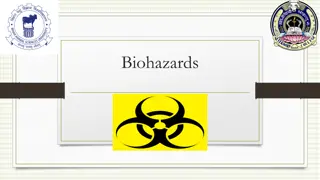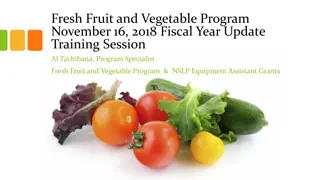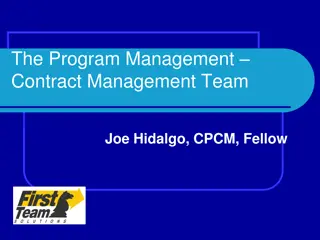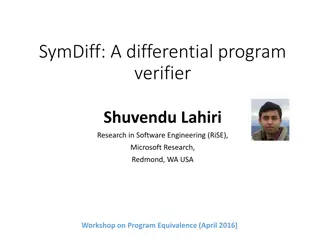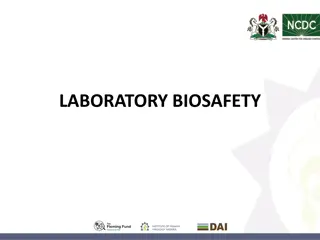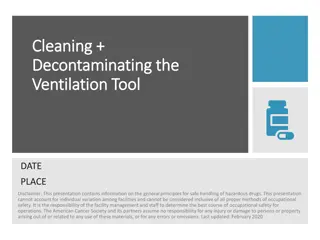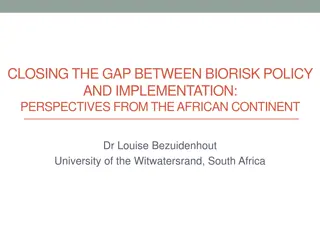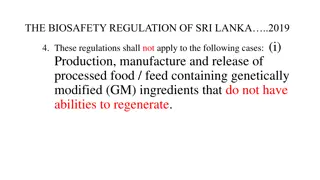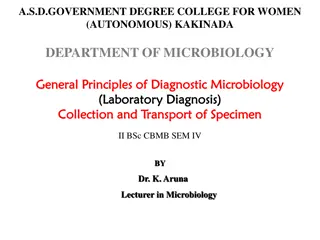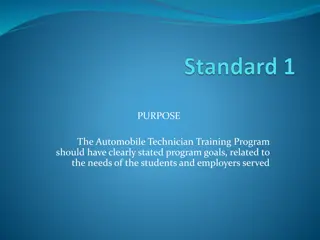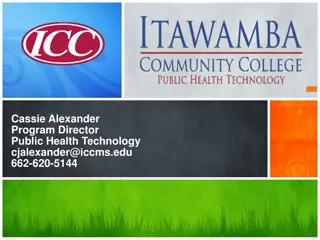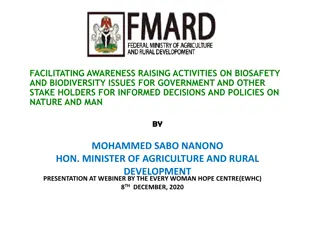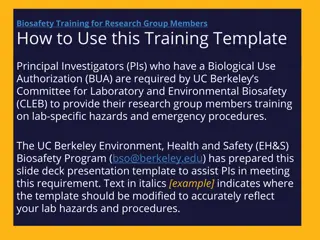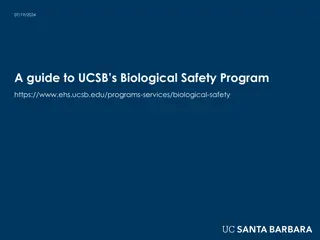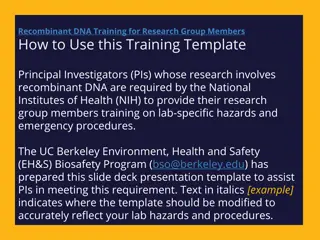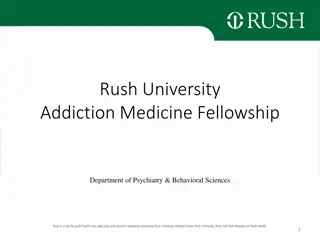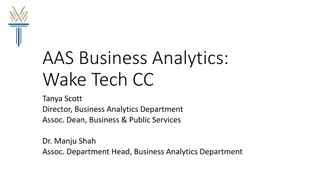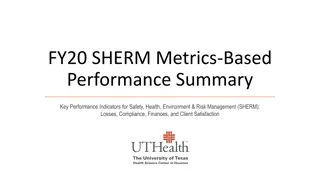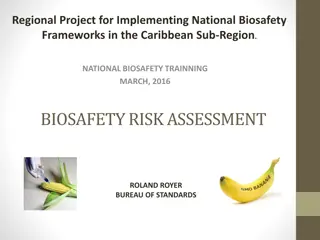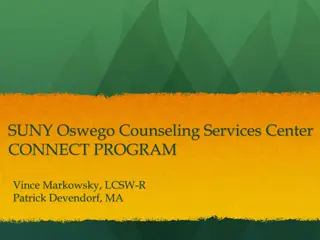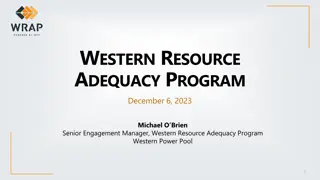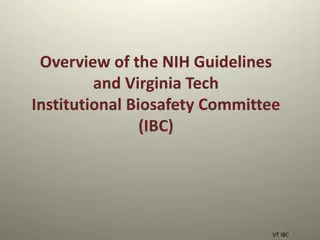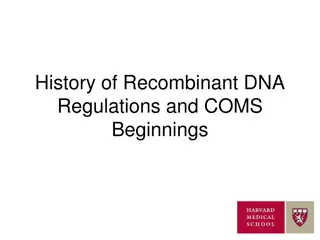Biosafety and IBC - Understanding Research Conduct and Safety Measures
Explore the essential aspects of biosafety and the role of Institutional Biosafety Committees (IBC) in ensuring responsible research conduct. Learn about biohazards, biosecurity, laboratory-acquired infections, routes of exposure, and the structure and functions of the IBC. Enhance your understandin
1 views • 13 slides
Welcome to Columbus State Nursing Program, Autumn 2023
Congratulations on your acceptance to the Nursing Program at Columbus State Community College! The Associate Degree Nursing Program offers a rigorous curriculum, but the faculty and staff are dedicated to supporting you every step of the way. Stay informed about COVID-19 updates affecting the progra
1 views • 34 slides
Biological Registration Process and Administrative Controls for Safety Focus
Registering work involving biological materials, toxins, and recombinant DNA is essential for safety compliance. Principal Investigators must follow NIH guidelines and register with the Institutional Biosafety Committee. Contact NIH for additional instructions on working with toxins and Select Agent
5 views • 13 slides
Ensuring Biosafety in Laboratory Settings: Barriers and Practices
Biosafety in laboratories involves implementing various barriers and practices to prevent the release of biological agents and protect lab workers. These include primary and secondary barriers, personal protective equipment (PPE), containment principles, and adherence to biosafety practices. Safety
1 views • 41 slides
Overview of Biosafety and Biosecurity in Global Health Security
The paper delivered at the 2022 Scientific Workshop highlights the importance of biosafety and biosecurity in the face of emerging infectious diseases. It defines key terms, emphasizes the need for containment procedures to manage biohazards, and addresses the critical pillars of biosafety and biose
0 views • 45 slides
Mississippi Home Corporation - National Housing Trust Fund Program Overview
Mississippi Home Corporation (MHC) administers the National Housing Trust Fund (HTF) Program in Mississippi to address housing needs for low-and-moderate-income residents. The program aims to enhance economic viability by providing safe, decent, and affordable housing options, helping families build
2 views • 95 slides
GTCC Career and College Promise Program Overview
North Carolina high school students can benefit from the Career and College Promise program offered by Guilford Technical Community College (GTCC). This program allows juniors and seniors to earn college credits at a community college campus tuition-free. Students must meet eligibility requirements,
2 views • 19 slides
Understanding Biosafety and Biosecurity Principles
Biosafety and Biosecurity are essential concepts in safeguarding against biological hazards. This article explores the definitions of hazard, threat, and risk, emphasizing the importance of managing risks associated with biological materials through biosafety and biosecurity measures. Learn about th
0 views • 26 slides
Delaware LIHEAP and Weatherization Assistance Program Details
In Delaware, the Low-Income Home Energy Assistance Program (LIHEAP) is managed by DHSS and DNREC, offering various components like Fuel Assistance Program (FAP) and Crisis Intervention Program (CIP). The program includes eligibility criteria, assistance types, and the Weatherization Assistance Progr
1 views • 5 slides
AFDO-Managed Retail Program Standards Grant Program Overview
The AFDO-Managed Retail Program Standards Grant Program has been successfully ensuring standards are met since 2014. With over 2,500 applications managed and impressive achievements in funded jurisdictions, this program has made significant progress in improving retail standards. Annual reach statis
0 views • 37 slides
Understanding Biohazards: Levels, Safety Precautions, and Risk Groups
Biological hazards or biohazards pose risks to human health through organisms like bacteria, viruses, parasites, and fungi. Biosafety and biosecurity measures are crucial to prevent exposure, with different biosafety levels and risk group classifications guiding safety protocols in laboratory settin
2 views • 12 slides
Program Advisory Committee Toolkit for Enhanced Program Advocacy
Enhance your program advocacy efforts with the Program Advisory Committee Toolkit, ensuring active member engagement, diverse representation, and required documentation for effective committee operations. Empower your committee to advocate for resources, connect with the community, and promote progr
0 views • 6 slides
Fresh Fruit and Vegetable Program Update Training Session
Fresh Fruit and Vegetable Program Update Training Session took place on November 16, 2018, focusing on program goals, objectives, school eligibility, funding allocation, and usage in Hawaii. The program aims to create a healthier school environment, increase students' produce consumption, and integr
1 views • 24 slides
Understanding the Dynamics of Program and Contract Management Team
The Program Management Contract Management Team, led by Joe Hidalgo, explores the synergy and conflicts between Program Managers and Contract Managers. Highlighting the importance of harmonizing business and program management skills for successful program execution in R&D environments, the content
1 views • 35 slides
Exploring SymDiff: A Differential Program Verifier
SymDiff is a platform that leverages program verification to analyze program differences, focusing on differential verification to verify properties of program variances rather than the program itself. The architecture, language subset, and modeling imperative programs/heaps are key components discu
1 views • 18 slides
Laboratory-Acquired Infections: Routes of Exposure and Prevention Measures
The content discusses laboratory-acquired infections from 1930 to 2015 and highlights exposure routes such as facial mucous membranes, percutaneous, ingestion, inhalation, and non-traditional routes like eye and nasal cavity. It emphasizes the importance of biosafety practices, identifies GI pathoge
0 views • 21 slides
Understanding Biosafety and Containment Measures in Laboratories
This content provides comprehensive information on biosafety, containment, biohazards, and the importance of preventing laboratory acquired infections. It covers the principles, practices, and procedures designed to safeguard against biological agents and toxins. The concept of biosecurity, containm
3 views • 17 slides
Safe Handling of Hazardous Drugs - Ventilation Tool Cleaning Procedures
This presentation outlines the proper procedures for cleaning, disinfecting, and organizing ventilation tools, emphasizing the importance of trained operators following written protocols. It covers waste handling, documentation, and the use of personal protective equipment (PPE) for occupational saf
0 views • 24 slides
Cutting-Edge Research Equipment and Studies at The Aga Khan University, Pakistan
The research facilities at The Aga Khan University in Pakistan boast state-of-the-art equipment for groundbreaking studies in areas like enteric fever prevention, rotavirus vaccine impact assessment, and dental stem cells. Researchers utilize specialized tools such as refrigerated centrifuges, biosa
0 views • 29 slides
Closing the Gap Between Biorisk Policy and Implementation in Africa
This presentation by Dr. Louise Bezuidenhout from the University of the Witwatersrand, South Africa, discusses the challenges and current developments in biosafety and biosecurity regulation in Africa. It outlines the research, funding, and policy landscape, focusing on the gap between policy formul
0 views • 14 slides
GMO Regulations in Sri Lanka: An Overview of Biosafety and Prohibitions
Sri Lanka's biosafety regulations of 2019 exempt certain cases involving genetically modified (GM) ingredients in processed foods. The regulations outline prohibitions on the import, sale, and distribution of GM organisms as food without approval. Additionally, the regulations address risks in proce
0 views • 12 slides
Heart of the City Piano Program Overview
Heart of the City Piano Program is dedicated to enhancing the lives of at-risk youth through a structured music program. Established in 1995, the program has expanded to multiple cities, including Edmonton, Vancouver, and Montreal. The program focuses on fostering positive lifestyle choices and prov
2 views • 33 slides
Collection and Transport of Specimens in Diagnostic Microbiology
Successful laboratory investigations depend on the proper collection and transport of specimens. This involves selecting adequate samples that represent the diseased area, avoiding contamination, obtaining specimens before administering antimicrobials, ensuring biosafety, proper documentation, and t
0 views • 20 slides
Automotive Technician Training Program Overview
This comprehensive program focuses on preparing students for employment in the automotive industry by providing specialized training aligned with industry needs. With clear program goals and a wide range of employment opportunities at dealerships, independent garages, and parts stores, graduates can
0 views • 85 slides
Public Health Technology Program at ICC: Empowering Healthcare Professionals
Award-winning community college ICC offers a unique Public Health Technology Program led by Program Director Cassie Alexander. The program addresses the increasing complexities of the healthcare system and aims to meet the high demand for skilled professionals in public health. With a focus on commu
0 views • 17 slides
Addressing Land Degradation Challenges in Agriculture for Sustainable Development
World agriculture has evolved over the decades, facing challenges like environmental degradation and land misuse. Awareness-raising activities on biosafety and biodiversity are crucial for informed decision-making in agriculture. Nigeria, with its diverse ecological zones, must sustainably manage na
0 views • 13 slides
Biosafety Training Requirements for Research Group Members
Principal Investigators with a Biological Use Authorization at UC Berkeley must provide lab-specific biosafety training to research group members. This training template covers CLEB administrative requirements, risk assessment, good work practices, emergency procedures, and more. Compliance ensures
0 views • 17 slides
Guide to UCSB Biological Safety Program
This guide provides an overview of UCSB's Biological Safety Program, covering important aspects such as lab safety fundamentals, biological use authorization, biosafety officer's role, and the Institutional Biosafety Committee. It outlines key steps like hazard assessment, training, waste management
0 views • 24 slides
Recombinant DNA Training Overview for Research Group Members
This training template is designed to assist Principal Investigators in providing lab-specific biosafety training to research group members working with recombinant DNA. It covers essential topics such as NIH guidelines, administrative requirements, risk assessment, emergency procedures, and more. C
0 views • 22 slides
Rush University Addiction Medicine Fellowship Overview
One-year ACGME-accredited multispecialty training program at Rush University focused on providing care for individuals with unhealthy substance use, substance use disorders, and other addictive disorders. The program utilizes a public health approach to comprehend the social and economic determinant
0 views • 24 slides
Business Analytics Program at Wake Tech Community College
Wake Tech Community College offers an Associate in Applied Science degree program in Business Analytics. The program aims to prepare students for careers in analytics fields such as Business Intelligence, Marketing Analytics, Finance Analytics, and Logistics Analytics. With a focus on employability,
0 views • 13 slides
SHERM's Impact and Response to COVID-19 at UTHealth
COVID-19 pandemic significantly influenced departmental operations at UTHealth, with services either increasing, maintaining, or deferring. SHERM staff, essential personnel working on-campus, adapted to high workloads and participated in furlough programs. Biosafety measures, travel restrictions, re
0 views • 46 slides
Understanding Risk Assessment for Biosafety in the Caribbean Sub-Region
Risk assessment is a structured approach to evaluating the potential harm from activities involving genetically modified organisms (GMOs) in order to protect health and the environment. It involves identifying, characterizing, and evaluating risks to determine the level of concern and the need for m
0 views • 16 slides
Japanese Studies Program at York University: Honours Minor Degree Program
Japanese Studies Program at York University offers a comprehensive Honours Minor Degree Program in Japanese Studies. This program features courses in Japanese language, culture, and linguistics, utilizing Technology Enhanced Learning for effective education. Students also have opportunities for stud
0 views • 17 slides
SUNY Oswego Counseling Services Center Connect Program Overview
The SUNY Oswego Counseling Services Center Connect Program, led by Vince Markowsky, LCSW-R, and Patrick Devendorf, MA, aims to support students in improving social connections and self-advocacy on campus through peer support groups and therapeutic processes. The program emphasizes inclusivity and co
0 views • 34 slides
Effective Student Learning Outcomes Assessment at the Program Level
Clarify the process for conducting Student Learning Outcomes Assessment at the Program Level by completing a Program Curriculum Map and an Outcomes Assessment Plan. Understand the activities for a 5-Year Cycle, ensure Program Integrity, and learn what to include in a Program Plan. Develop Program Mi
1 views • 23 slides
Western Resource Adequacy Program Overview
Western Resource Adequacy Program (WRAP) is a vital initiative in the Western Power Pool, providing valuable grid integration and coordination services to its customer-members across the entire Western Interconnection. As the Program Administrator, Western Power Pool undertakes all necessary actions
0 views • 11 slides
Understanding NIH Guidelines and Virginia Tech's Institutional Biosafety Committee
The NIH Guidelines and Virginia Tech's Institutional Biosafety Committee play crucial roles in ensuring safety and compliance in research involving recombinant and synthetic nucleic acids. The guidelines outline biosafety practices and procedures, while the committee oversees the establishment of po
0 views • 24 slides
Understanding COMS and Recombinant DNA Regulations
The Committee on Microbiological Safety (COMS) was established in 1978 to address public concerns regarding safety, environment, and ethics of research involving hazardous biological agents. COMS oversees activities related to recombinant DNA and biological agents at Harvard, supporting all schools
0 views • 6 slides
Understanding Nipah Virus: A Comprehensive Overview
Nipah virus, belonging to the Paramyxoviridae family, is a zoonotic virus with high pathogenicity and mortality rates. It falls under the Henipavirus genus, known for infecting a wide range of animal species. Its virion structure consists of non-segmented, negative-sense RNA, and the viral genome co
0 views • 22 slides
